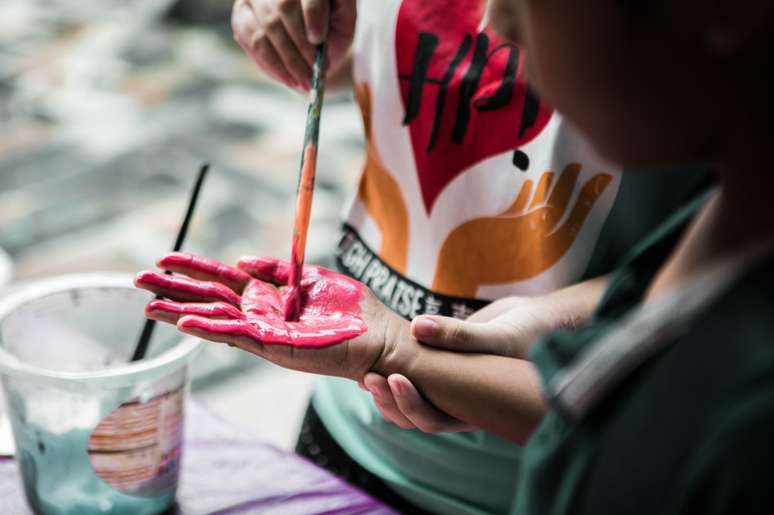It’s not always easy to help children overcome challenges. Through numerology, you can use your experience to help your children
We all inherit from our parents beliefs, values and tendencies that will influence the way we live, from fears to talents. But how can we help children overcome challenges?
Numerology can help in this regard. By analyzing your name and date of birth, this study reveals through the numbers of the Challenges and Lessons what vulnerable points you and your children have.
With this, you can help children overcome challenges, as you learn to inspire them and they learn to build their own style to overcome difficulties.
Next, we show you how to find the challenge and lesson numbers in your numerology chart and then give you 5 tips to help children overcome the challenges based on their experiences.
How to do numerological analysis
Follow this step by step:
- Access the free children’s map here.
- Generate two maps, one for you and one for the child. To do this, simply provide your full name and date of birth.
- Then, see in the highlighting what numbers of Challenges and Lessons you and your child have.
- Compare the numbers and see which ones repeat on your and your child’s maps.
- Write it down and then read the analysis below for the Challenge numbers and Lessons that repeat
Tips for helping children overcome challenges
If you and your child have a 1 in the Challenge or Lesson
- Try to remember how you overcame your insecurity to walk your own path and how you learned to make your own decisions. This will help your child learn to embrace and develop the creative, original and assertive side of him.
- Provide compassionate support so your children are confident in their abilities and know how to deal with possible conflicts with authority figures.
- Share your examples, tell how you overcame a conflict with your mother, father, someone who guided you.
- Count when you felt most confident taking risks and making your own decisions.
- Explain how you have benefited from facing your fears with creative and courageous actions. Here you can understand what your hidden talents are and this can help you even more.
- Try not to expect too much from your child when faced with challenges to lead, dare and stand out in an original way.
- And give her your inspiring support, full of praise and encouragement so that she feels she is able to lead her classmates in games, be a class leader, and verbalize her creative ideas.
If you and your child have a 2 in the Challenge or Lesson
- You and your child face the same challenge in managing emotions and engaging in more intimate relationships and partnerships.
- Remember how you overcame your resistance to forming closer bonds with people, especially emotionally.
- Help your child understand why he or she is reluctant to become intimate with someone considered important in his or her life. The idea is that you can detect when she is most sensitive or emotionally withdrawn.
- Try sharing with your child the fears you had about showing your sensitivity and expressing your feelings. This will make him face his fear of revealing his emotions more naturally.
- By encouraging him to overcome the fear of suffering when he is more intimately involved with someone, whether in a friendship or a relationship, he will feel more courageous. Even more so if you can provide him with practical examples of the advantages of an enriching relationship.
- Furthermore, show your child that he can count on your support to deal naturally with his own sensitivity and emotions.
If you and your child have a 3 in the Challenge or Lesson
- Your child may be reluctant to expose themselves and communicate. Because you have experienced similar fears, you can help your child express himself creatively and receive nourishing emotional responses.
- Help your child develop expressive, artistic and communication skills. Have fun and understand how he communicates by looking at Mercury in your child’s birth chart here.
- A child with challenging positions symbolized by the 3, as is the case with your son, tends to feel very excited and inspired when he meets someone who knows how to shine and charm people through his self-expression. And if that person is the father or mother, even better.
- Your child may have a natural ability to capture and reflect people’s emotional states. Lead by example and have a confident, optimistic and creative attitude so that your child sees you as a motivating light.
- Share with your child some experiences you have had to overcome, such as criticism, shyness, or indifferent reactions you received when you demonstrated artistic or communication skills.
- In this way, your little one will realize that you did not let these adverse reactions discourage you and continued to expose yourself, creating and radiating your expressive talents.
If you and your child have a 4 in the Challenge or Lesson
- As you and your child identify with the difficulties associated with Number 4, you will be better able to teach them to persist in a planned, disciplined and efficient manner towards whatever they want to accomplish. Yoga from a young age can also help.
- In times when your child is complacent, has difficulty carrying out certain activities in a practical way, explain how you can overcome a lack of courage in the face of an obstacle, explaining what to do to move forward and get what you want.
- Create situations that encourage the development of your child’s practical side.
- Teach her how much responsibility matures and how stimulating it is for her to face family and personal duties more willingly.
- It is important that you and your child understand that it is necessary to alternate periods of work with periods of rest, to recharge your energy.
If you and your child have a 5 in the Challenge or Lesson
- Since they share Number 5 in difficult positions, you will most likely understand your child’s resistance to accepting change.
- Remember all the times you were afraid to change, preferring to leave things as they were, precisely out of resistance to seeking new experiences.
- Your child may have a habit of quickly moving from one activity to another, choosing which priorities will satisfy him. Positive affirmations can be great for your child, see here.
- Support your child when he has to make new choices and experience the pleasure of experiencing something that teaches him more about himself, about being human and about life.
- Help your child to prioritize certain activities and not get carried away by the urge to hastily change when something more attractive comes along.
- Since you have demonstrated the value of discipline in practice by engaging in an activity, you will be able to motivate your little one to do it.
- Help your child have more motivation to open up to changes, learn from experiences and develop his progressive talent.
If you and your child have a 6 in the Challenge or Lesson
- You, having had to overcome the difficulties related to Number 6 (which your son also has), will know how much your son likes to be useful to people, especially his family. Share how freeing it has been to admit that you are not a perfect human being.
- Say how beneficial it is to not expect too much of yourself or expect too much of people.
- The Challenge or Lesson of the 6 also represents the tendency to harshly judge one’s own and others’ behavior when it comes to being correct and impeccable.
- By looking at yourself and understanding that you don’t have to be perfect to help others and contribute socially, your child will be more willing to develop their humanitarian skills.
- Help your child advise people.
If you and your child have a 7 in the Challenge or Lesson
- Also having Number 7 in a difficult position, you may have an easier time understanding your child’s suspicious nature.
- Help your child understand that showing emotional vulnerability is a sign of strength.
- By demonstrating receptivity to your little one’s emotional expression, you can embrace his or her fears and desires.
- Try to expose your fears or tell your child about a situation in which it was worth revealing what you felt, thought and perceived.
- Help your child reduce mistrust so he or she can feel comfortable creating enriching intimate bonds. Have you ever thought about it use Ho’oponopono with your son? You understand here.
If you and your child have an 8 in the Challenge or Lesson
- You and your child have the same fear of facing the problems associated with the number 8. This means that you tend to understand your little one’s fear and fascination with success, even financial success.
- Explain how you have already recovered from a material loss and rebuilt a financial and professional situation, so that your child learns to appreciate what he gets.
- Help your child when he is afraid of occupying a position of importance and leadership, precisely because he doesn’t know if he will be prepared to face power.
- Share a situation where you ended up sabotaging yourself and missing out on a promising opportunity.
- Explain to your little one the importance of owning his ambitions and his ability to persevere in achieving what he wanted.
- Encourage your child to be organized, planning and practical. This objective position will be very valuable for your child so that he feels more courageous in overcoming resistance and taking on responsibilities.
If you and your child have a 9 in the Challenge or Lesson
- When your child is discouraged because he saw a classmate go against advice, you can better help him.
- Having experienced difficult situations associated with the 9, you will know how discouraged you were when your loved ones did not want to be helped or because they did not follow what you suggested to them.
- You may have learned that every gesture of help is like a seed planted in the heart of the person being helped. As time passes, flowering occurs and the fruits become visible.
- Teach your child to develop this understanding of each person’s growth process.
- Share what you experienced when you were disappointed because someone didn’t follow your advice and example. If your child reacts rebelliously, saying he doesn’t want to help anyone else, help him be an example of what you recommend.
- Use your experience as a model to teach your child that the true pleasure of giving is simply being helpful. It’s about giving back to the world, regardless of getting recognition for that donation from those you helped.
The mail How to help children overcome challenges appeared first Personalize.
Yub Miranda (yubmiranda@yahoo.com.br)
– Numerologist, astrologer and tarot reader.
Source: Terra
Ben Stock is a lifestyle journalist and author at Gossipify. He writes about topics such as health, wellness, travel, food and home decor. He provides practical advice and inspiration to improve well-being, keeps readers up to date with latest lifestyle news and trends, known for his engaging writing style, in-depth analysis and unique perspectives.







-s4ulyunpwtpd.png)
